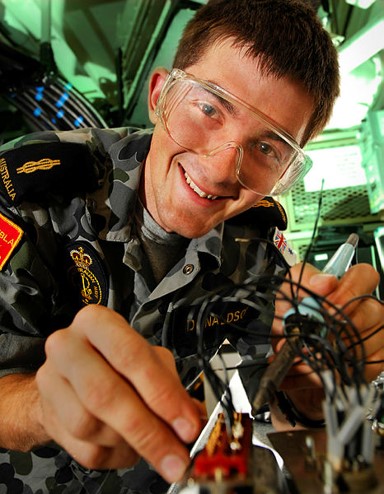
“Those team skills from playing football and the communication skills from my part-time job helped me come out of my shell during recruit school. This allowed me to gain the confidence I needed to be a part of something way bigger than me.”
If you want to see the world and have an incredible career, there’s nothing like the Australian Defence Force according to Hamish.
What does an Electronics Technician do?
As an Electronics Technician (aka ‘ET’ or ‘Greenie’) in the Navy, you’re responsible for the maintenance and upkeep of all communication, sensor and fixed ship weapons systems. In my category ‘Sensors’, we focus on repair and maintaining RADARs, Meteorological systems, echo sounding instruments and some fixed weapon systems.
What’s the best thing about your job?
We do a lot of work up the ship’s masts and superstructure. We get an amazing view of wherever we are.
What hard skills and soft skills have you found vital for this job?
When working with systems that the whole ship is relying on, you have to have the confidence that you know the state of your equipment and are able to fix it if a problem does arise. When I joined I was lacking in confidence and leadership skills. So just by doing my job, working with unique people, and in different environments, it’s helped me to develop those skills.
Describe what your average day at work looks like
It really depends on what the ship is doing and where we are going. When we are at cruising stations (transiting or general operation state) we’ll get up around 6:45-7, then do the standard brekky and bathe, muster as a department and get the goss on what’s happening. Then we’ll get into our maintenance and repairs. We do routine maintenance on all our systems to make sure there are no surprises. We’ll have lunch around 12 and some days we’ll do a damage control exercise (aka ‘DC’) in the arvo. A DC is where we simulate an incident on-board (fire/floor/toxic hazard). This is standard training for all ship’s company so we can act if we have a real incident. Once you’ve done all your maintenance, we’ll finish around 4ish and, as long as nothing breaks, your time is your own; it might be gym, movies, personal admin.
What are some of the challenges of your job?
Many of our systems are crucial for the ship so we may have to be woken up at stupid o’clock to fix a fault or issue. Because of this ET’s generally don’t do ‘watch keeping’ in cruising stations. There are also a lot of challenges that come with being a sailor in general. Everyone on the ship has additional duties outside of their role. This can include things like damage control at unprecedented times, protection of the ship, boarding operations and then there’s things like being away from home, family and loved ones for a prolonged time.
What drew you to this job in the first place?
I wanted to see the world and a career in Tassie didn’t offer what I wanted. My father was in the Air Force so I had a little inside information on what I could get out of the ADF. When I applied I was originally going for a Combat Systems Operator But after talking to my Careers Coach I started leaning towards the ET role. I really enjoy pulling electronics apart, fixing, and rebuilding them.
What subjects did you study in Year 11 & 12?
I studied Japanese, 3D Graphic Design, Drama, Photography, English Applied and Mathematics Methods 5. I chose the majority of these subjects just as fun, which helped to break up the more complex ones like Mathematics and English. My father told me that I should maintain English and Mathematics throughout my studies as they’ll open up great opportunities for me later on if I commit myself.
Looking back at school/college days, what life skills did you start to develop that you use now? (i.e. casual job at Coles taught me how to communicate with people at all levels, being a football captain taught me about team work etc)
I played a lot of football in high school. I also had a casual job at EB Games when it opened in Launceston and that helped me develop my communication skills and boosted my confidence. When I joined I was very introverted – it was a very alien environment full of uncertainty. Those team skills from playing football and the communication skills from my part-time job helped me come out of my shell during recruit school. This allowed me to gain the confidence I needed to be a part of something way bigger than me.
What sort of roadblocks have you hit so far in your career? How did you feel at the time and how did you work around it?
It can be daunting sometimes to speak up if you feel something is wrong. I won’t lie and say my career has always been sunshine and roses. There have been some incredibly trying times. I look back at some of those times and wish I had spoken up earlier. I knew things weren’t right and I had the power to change them, but I didn’t. I didn’t speak up in fear of the ramifications of my actions. However, not speaking up just caused difficult times to fester and become worse. I’ve learnt from those experiences and feel that I am more confident with myself to make the right decisions and speak up if needed, even if it does ruffle some feathers.
What advice would you give someone thinking of becoming a Electronics Technician?
Do your research and ask questions. There is nothing like the ADF and it pays off to get the information you need as soon as you can. As for being an ET, just like most of the careers in the ADF, it’s important to remember that it’s a military environment and you’re trained to maintain and operate military equipment. Although a lot of the qualifications I have don’t line up directly with civilian skills, they reach a much broader array of skills and qualifications. You get skills for just doing your job, be it combat and security, community support, or even fire-fighting and incident response.

Find out more
Find out more about careers in the Australian Defence Force. Join through ADF Careers to explore 300+ roles across Navy, Army and Air Force. Try an ADF Gap Year (paid 12‑month placement). Or train as an officer at ADFA with a UNSW Canberra degree.
Even while you’re still in school, you can begin building your future through Work-based Learning (WBL), School-based Apprenticeships (ASbA), and VET qualifications. These programs give you hands-on experience and real-world skills to prepare for a successful career in the Australian Defence Force.
